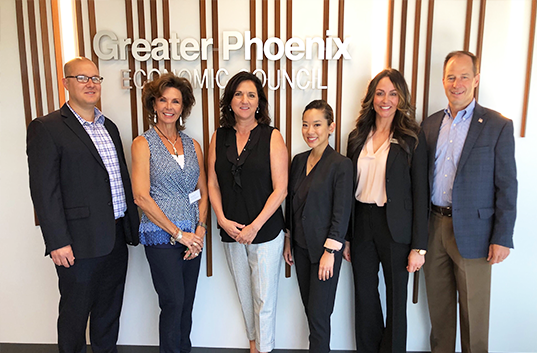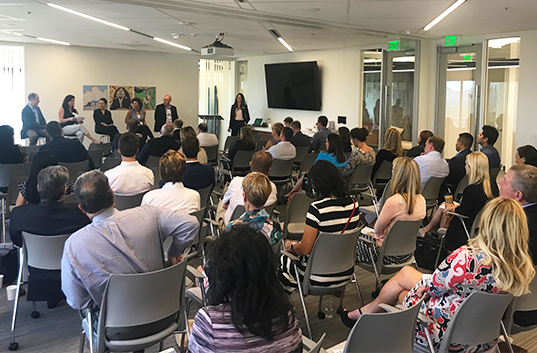

Employment, education experts explore the future of workforce
Published: 07/03/2019
Updated: 03/31/2025
How Greater Phoenix can better prepare students, job seekers for careers
Greater Phoenix is a top region to build a business and find employment because of its pro-business climate, talented pipeline, and accessibility to multiple consumer bases. As the region grows and adopts new technology, many employers are starting to ask how they can not only provide jobs for the workforce but how to ensure that their employees feel valued and are prepared for jobs that don’t exist yet.
To better understand the workforce evolution, the Greater Phoenix Economic Council (GPEC) partnered with Pipeline AZ to host an Ambassador panel featuring industry experts. Pipeline AZ is a job search platform that provides real-time labor market information and uncovers options to help people make better decisions about their careers. Through Pipeline AZ, Arizona’s workforce can utilize their current and potential skills in a job where they are most valuable.
The panelists included Scott Celley, managing partner of Trifecta Communications; Denise Gredler, the founder and CEO of BestCompaniesAZ and BestCompaniesTexas; Grace O’Sullivan, associate vice president of corporate engagement and strategic partnerships at Arizona State University; Leah Palmer, executive director of the Arizona Advanced Manufacturing Institute at Mesa Community College; and Ryan Withem, Phoenix workforce solutions manager of CompTIA. The panel was moderated by Katherine Pappas, the director of workforce strategy of Partnership for Economic Innovation (PEI), with more than 50 attendees in the audience.
“There is a lot of great work that is happening around the community and our state, but it is sometimes happening in siloed efforts,” Pappas said. “Pipeline AZ is streamlining all the different efforts that are happening and making these connections through skills and abilities, not just occupations, job titles and four-year degrees but with other curriculum and certifications.
How should companies prepare for workforce changes?
The panelists agreed that it’s important for companies to provide the tools their employees need to embrace change.
“I think organizations should be telling their employees that ‘next year you may not be doing what you are doing today, but let’s find a way to utilize the skills you already have while also teaching you new skills.” Ryan Withem said.
This question brought up the fear of uncertainty that surrounds people who may not see pathways in the workforce for them.
“Tools like Pipeline AZ and the work we are doing with our employers to connect the different pathways, will provide inspiration and alleviate that fear the more we tell our story as a model for others to adopt,” Leah Palmer said.
Scott Celley mentioned that he sees Arizona as a place where entrepreneurs are moving to and seeking career opportunities, and that change in the workforce is evident.
“Every one of these transformative changes, whether it be AI or virtual reality, creates opportunity for new jobs and new industries,” Celley said. “The people here are looking for the next opportunity and innovation has a much better chance in Arizona than a lot of other places.”
How can workers prepare today for jobs that don’t exist yet?
“I would assume that most of the jobs that we are in today didn’t exist 50 years ago,” Grace O’Sullivan said. “Maybe we should assume that most jobs we are currently in will not exist in the future. We have to learn how to learn and we have to build skills that develop us as people like project management, problem solving and communication, as well as the mindset of being willing to learn new things. Jobs are replaceable, but skills are not.”
Palmer mentioned that it is helpful when companies provide in-depth training to students before they graduate rather than expecting to find the perfect employee who fits their job description. She shared an anecdote about how The Boeing Company partnered with Mesa Community College to identify and train future employees. They did so by having Boeing employees teach a two-month long program to community college students. Those who earn the industry-recognized certification will be reimbursed for the program tuition and demonstrate required skills for employment.
Here is a look at Arizona’s projected workforce pipeline from 2016 through 2026:
- Total employment is projected to grow by 542,795 jobs over the 10-year period, reaching 3,465,150 jobs in 2026
- Industry employment is projected to grow at a rate of 1.7% per year from 2016 to 2026, significantly faster than the 0.2% growth rate recorded from 2006 to 2016
- All 11 industry sectors are projected to add jobs
- The Educational and Health Services sector is projected to add the largest number of jobs (2.6% growth and 183,544 jobs)
- Construction is projected to record the largest percentage gain (3% growth and 47,838 jobs)
Are you interested in staying up-to-date on Greater Phoenix’s growth and advocating for the region’s competitiveness? Become an Ambassador – learn more.
